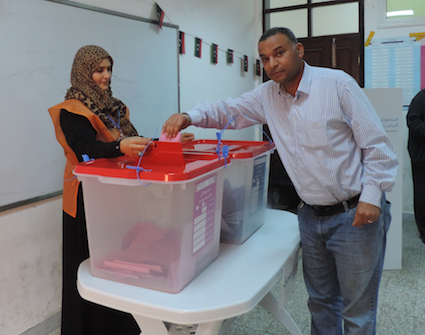By Callum Paton.

Tripoli, 20 February 2014:
Elections centres all over Libya opened at 8 am this morning for the elections . . .[restrict]to the constitutional drafting committee. Polls will close at 7 pm this evening.
At polling station No. 14045 in Tripoli’s Ras Hassan district, a trickle of voters were making their way in and out of a small classroom that was being used as one of five polling areas to cast their ballots. There was little queueing – two minutes at most. There were two polling sections for men, two for women and one for disabled voters.
The head of the polling station, Amal Zaik, told the Libya Herald that although traffic had been slow she expected voting to pick up the afternoon as the centre’s 1,000 resistered electors made the most of today’s national holiday.
She said materials for the polling centre had arrived at the school, where she is also a teacher, one week ago and there had been hurried preparations last night to make the centre ready for the morning.
Bashir Graghoum, a local elections observer, said he had visited four polling centre so far this morning and hoped to see between ten and twenty throughout the day. He said those he had been to on the Airport Road and in Abu Saleem had, like Batata, been quiet, adding that he been impressed with security at all four.
Graghoum explained that he had been a political prisoner in Abu Saleem Prison for 19 years after he joined the Libyan National Front Party in opposition to the former regime. He said he used to dream of democratic elections like these inside the prison but could never have been sure they would become a reality.
He said turnout could not be expected to be high today as and been the case in the 2012 general election because people had become disillusioned with Congress. He added, however, that elections to the Constitutional Committee were still an important step forward in the evolution of the country.
At polling centre No. 14152 at the Shoula Primary and Elementary School in central Tripoli’s Dahra district, there was a steady number of voters throughout the morning. By midday, 323 people had voted out of the some 1,600 registered for the centre, some 20 percent. Two thirds were men, reflecting the higher number of men than women who had registered to vote.
In another polling centre, in the high school in nearby Shara Ennasr, where 1,595 people were registered to vote, the flow was similar. In both places, however, polling staff, almost all of them teachers at the same schools, likewise said that they expected numbers to pickup in the afternoon.
Both places had several security staff outside.
In Misrata, however, voting was brisker.
At Al Mangoush School in downtown Misrata, by 1 pm, it was reported that 689 out of 1,652 male voters registered for the polling centre (42 percent) had voted and 143 female voters out of 666 registered (21 percent).
“Everything is running well, and the stations are secure”, an election observer told this paper.
In Benghazi, however, turnout appears to be much lower. At both the Yusef Bukr school in Fuwaihat and the nearby Ittihad School, turnout was put at just 10 percent at 1 1 pm. “We had expected more”, an election organiser told the Libya Herald.
Low turnouts were reported at other polling centres in the city. [/restrict]







